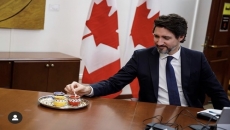Now that he's the president-elect, Joe Biden is doubling down on his promise that economic recovery efforts in the United States will remain a made-in-America endeavour.
Biden, who was vice-president when Canada last confronted a Democrat's protectionist Buy American provisions, pared the commitment down to a simple sound bite Monday during a speech from his base of operations in Delaware.
"From autos to our stockpiles, we’re going to buy American," Biden said.
"No government contracts will be given to companies that don’t make their products here in America."
It was a succinct and unmistakable distillation of the Buy American plan Biden laid out during the election campaign, which includes a specialized "Made in America" office within the White House to enforce and oversee the measures.
It took Canada nearly a year to negotiate waivers to similar rules in 2010 when Barack Obama's administration was preparing to spend more than $800 billion to bounce back from the Great Recession.
Biden's plan also includes executive orders to more strictly enforce, expand and tighten the provisions, a strategy to make U.S. products more competitive and to expand the list of "critical materials" that must be American-made.
And ever since it was unveiled, Canadian officials on both sides of the border, including Foreign Affairs Minister François-Philippe Champagne, have been talking about plans to sell the U.S. on a different approach: "Buy North American."
"When I think of resiliency, if there are two countries where the supply chains are integrated, it's Canada and the United States," Champagne said Monday when asked about Biden's remarks.
What looms is a chance to capitalize on that integration and create millions of jobs in both the U.S. and Canada, Champagne said.
"The big prize for us is to say, how can we innovate more together, how can we manufacture more together, how can we sell more together to the rest of the world?"
At virtually the same time Biden was speaking Monday, the House of Commons in Ottawa unanimously passed a motion tabled by NDP House leader Peter Julian to invite Biden to address Parliament once he is sworn in as president.
Julian intended the motion as a show of goodwill and bilateral teamwork on issues like climate change and "social and economic justice," he tweeted. But the Conservatives put a different spin on their decision to support it.
"The fate of the Keystone XL pipeline is now in question and is an urgent issue that requires immediate attention," Conservative MP Michael Chong said in a statement following the vote.
"Conservatives expect that the prime minister will emphasize the importance of Keystone XL to ensure that this important project continues to move forward for the benefit of Canadian and American workers."
The fate of the plan to expand the pipeline, which would ferry over 800,000 barrels more per day of diluted bitumen from the Alberta oilsands to refineries along the U.S. Gulf Coast, has been in question for years.
But the latest uncertainty about the pipeline is a direct result of Biden's own campaign, which issued a statement in May that promised to "stop it for good" by rescinding President Donald Trump's approvals for the multibillion-dollar project.
There again, Canada's advocates talk about the need for an integrated approach, discussing energy and the environment as two sides of the same mutually beneficial coin.
"Canada's one of the only major suppliers to the U.S. that has a price on carbon, that has a goal to achieve net-zero emissions by 2050," Kirsten Hillman, Canada's envoy to Washington, said in a recent interview.
"Even if we are transitioning to a lower carbon economy, we're going to need these forms of fuel for a long time."






